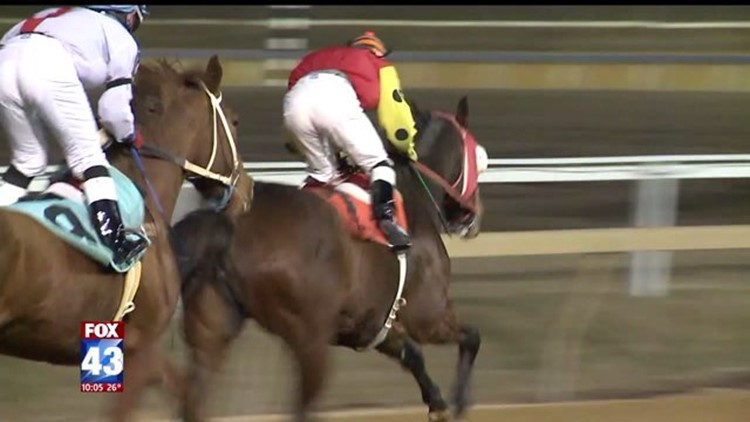Noting it’s been more than 30 years since there were any major updates to Pennsylvania’s horse racing laws, Deputy Agriculture Secretary Mathew Meals said Wednesday that funding and regulatory issues need to be addressed “to rebuild this industry.”
Over the last several weeks, FOX43 has interviewed a variety of people involved in horse racing and involved in efforts to improve oversight and safety.
Nationally recognized horse owner Gretchen Jackson has called for improved drug testing and punishments for rule violators.
“It’s up to the human beings, the trainers, the owners, to stick up for the horse,” said Jackson.
The Racing Medication and Testing Consortium aggregates rulings across the country regarding improper drug and medication use. The database can be seen by clicking here.
The most recent data on the site, from the first six months of 2013, lists 17 cases involving thoroughbred and quarter horse rulings in Pennsylvania. Punishments varied based on the kind of drug involved and the potential effects on horses.
“We have one of the top three laboratories for equine toxicology within the country,” said Meals.
In addition to purses being surrendered, violators faced fines ranging from $250 to $1,500. The site also shows one owner/trainer having been suspended for 90 days.
FOX43 filed a Right-to-Know request with the Agriculture Department to obtain more details about recent cases and how the Horse Racing Commission has handled them.
We received about 400 pages of documents that detailed all appeals brought to the commission between October 2011 and September 2013.
That included 23 cases, seven of which involved horses testing positive for drugs that should not have been in their systems on race day. Punishments in the cases included some combination of purses being surrendered and suspensions. In two of the cases, trainers were fined between $1,000 to $2,000. Suspensions varied from zero to 180 days.
Jackson said existing penalties have not done enough to encourage everyone to play by the rules.
“They’re not really tough punishments. They’re not tough enough,” said Jackson.
In one case FOX43 reviewed, a horse called “Fusetheopportunity” tested positive for tamoxifen after a May 2011 race at Parx, near Philadelphia. Tamoxifen is an anti-cancer agent used to treat breast cancer. It has no known medical use in horses.
The Board of Stewards cited the horse’s trainer, Anthony Correnti, directing that the purse be redistributed and saying the drug “falls most fittingly under the Class 3 classification.” According to the Association of Racing Commissioners’ International guidelines, the recommended minimum penalty was a 15-day suspension and a $500 fine.
Correnti was suspended for 15 days but not fined, according to the Horse Racing Commission documents. Correnti appealed the decision. During that appeal, it was noted “the penalty that was imposed…was less than that recommended under the ARCI guidelines.”
The Horse Racing Commission upheld the penalty.
FOX43 asked Deputy Secretary Meals, “If there are trainers not even getting the minimum recommended punishments, how is the message being sent to these trainers to behave well?”
Meals replied, “Well, I think we really need to look at that case. I’m not familiar with the exact case you’re looking at…We continue to enforce to the best of our ability, and without looking at the specifics, there may be situations outside the commission’s control why that was not enforced at the minimum.”
Meals noted in cases where the statutory limit is met, other law enforcement agencies have gotten involved.
A bill sponsored by state Sen. Elder Vogel (R-47th) would eliminate the state’s Horse and Harness Racing Commissions, giving oversight responsibility to the Gaming Control Board. To view the bill, click here.
“Overall, you need more independent oversight. Putting everything under the Gaming Control Board is a good first step,” said Vogel.
Last fall, state lawmakers acted to give the commission an additional $5 million after it was made known they expected to run out of money months before the fiscal year ended.
Deputy Sec. Meals noted the largest funding source for the commission is parimutuel betting, of which he said, “We’ve been seeing about an eight to 12 percent decline in that funding over the last couple years on a yearly basis.”
When asked about what additional steps the Agriculture Department should take regarding safety, Meals said, “Before we can take any more look at that, we need to fix the two major problems, and that’s the funding model that we currently have for our commissions and also the regulatory statutes that we have to work within. We know that both of them need (to be) updated. We’ve looked at them very closely. And, that’s really the foundation of starting to rebuild this industry.”



